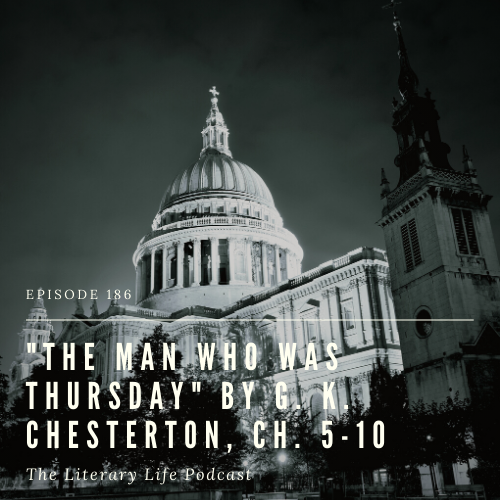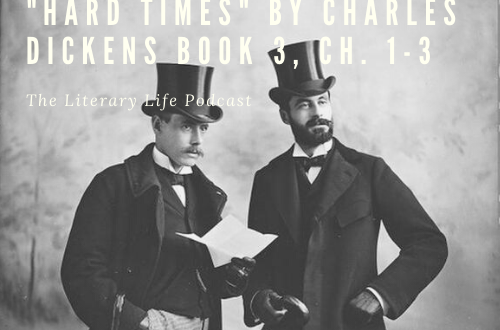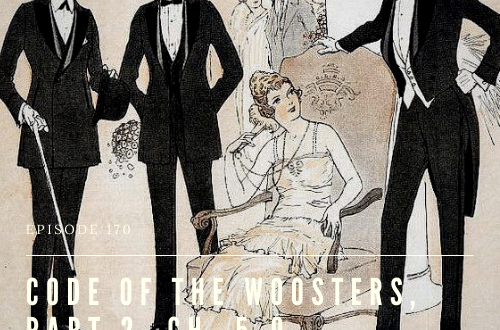
Episode 186: “The Man Who Was Thursday” by G. K. Chesterton, Ch. 5-10
On the Literary Life podcast this week Angelina, Cindy and Thomas continue their series on G. K. Chesterton’s The Man Who Was Thursday. Before diving into the plot of these chapters, our hosts discuss the similarities and differences between Chesterton and Kafka’s works of fiction. Thomas gives some historical context on anarchy as well as assassinations in the time period of this book. Angelina points out the Dante-esque language in this section, as well as the continuing themes of chivalry. Cindy highlights the character of Sunday and how he looms large, quite literally, over everyone’s imaginations in the story. Some other thoughts our hosts discuss include modernity’s mindset as it relates to the atmosphere of this story, the idea of the underdog fighting against all odds, and the humorous moments that break some of the tension. Be sure to come back next week when we wrap up our series on The Man Who Was Thursday.
If you missed our 2023 Back to School Conference when it was live, you can still go back and view the recordings when you purchase access to the conference at MorningTimeforMom.com.
Angelina is teaching a class on How to Read Beowulf at the end of August 2023. Get in on this mini-class at House of Humane Letters.
Thomas is also teaching a webinar along with Michael Williams on the modern poets W. H. Auden and T. S. Eliot on September 28th. You can now register at House of Humane Letters.
Listen Now:
Commonplace Quotes:
It’s important, too, that everything that has a story, such as a myth, should be read or listened to purely as a story. Many people grow up without really understanding the difference between imaginative and discursive writing. On the rare occasions when they encounter poems or even pictures, they treat them exactly as though they were intended to be pieces of more or less disguised information. Their questions are all based on this assumption: “What is he trying to get across?” “What am I supposed to get out of it?” “Why doesn’t someone explain it to me?” “Why couldn’t he have written it in a different way so that I could understand him?” The art of listening to story is a basic training for the imagination.
Northrop Frye, The Educated Imagination
The biographer is there to explain rather than to judge. To get a clear view of a man we do not need to be told if his actions were good…but how and why he came to do them.
Lord David Cecil, “Modern Biography”
Or read again The Man Who Was Thursday. Compare it with another good writer, Kafka. Is the difference simply that the one is ‘dated’ and the other contemporary? Or is it rather that while both give a powerful picture of the loneliness and bewilderment which each one of us encounters in his (apparently) single-handed struggle with the universe, Chesterton, attributing to the universe a more complicated disguise, and admitting the exhilaration as well as the terror of the struggle, has got in rather more, is more balanced: in that sense, more classical, more permanent?
C. S. Lewis, “Period Criticism”
Selection from Paradise Lost, Book 1
by John Milton
Innumerable force of Spirits arm’d
That durst dislike his reign, and me preferring,
His utmost power with adverse power oppos’d
In dubious Battel on the Plains of Heav’n,
And shook his throne. What though the field be lost?
All is not lost; the unconquerable Will,
And study of revenge, immortal hate,
And courage never to submit or yield:
And what is else not to be overcome?
Books Mentioned:
The Oxford Book of Christian Verse ed. by Lord David Cecil
On Stories by C. S. Lewis
The Trial by Franz Kafka
The Castle by Franz Kafka
Day of the Assassins by Michael Burleigh
The Defendant by G. K. Chesterton
The Song of Roland trans. by Dorothy L. Sayers
Tess of the D’Urbervilles by Thomas Hardy
King Lear by William Shakespeare
The Duchess of Malfi by John Webster
Support The Literary Life:
Become a patron of The Literary Life podcast as part of the “Friends and Fellows Community” on Patreon, and get some amazing bonus content! Thanks for your support!
Connect with Us:
You can find Angelina and Thomas at HouseofHumaneLetters.com, on Instagram @angelinastanford, and on Facebook at https://www.facebook.com/ANGStanford/
Find Cindy at morningtimeformoms.com, on Instagram @cindyordoamoris and on Facebook at https://www.facebook.com/cindyrollins.net/. Check out Cindy’s own Patreon page also!
Follow The Literary Life on Instagram, and jump into our private Facebook group, The Literary Life Discussion Group, and let’s get the book talk going! http://bit.ly/literarylifeFB
Subscribe to The Lit Life:








